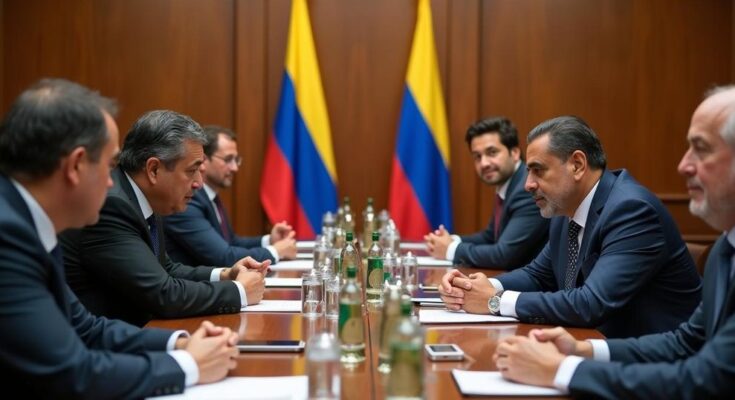Dr. Ralph Gonsalves, Prime Minister of Saint Vincent and the Grenadines, believes that Nicolas Maduro’s presidency in Venezuela is advantageous for Guyana’s oil sector. He emphasizes the rejection of right-wing opposition in Venezuela as security for Guyana, advocates for non-violence in resolving disputes, and asserts the need for peace between the two nations while maintaining the historical context of American influence in the region.
In a recent statement, the Prime Minister of Saint Vincent and the Grenadines, Dr. Ralph Gonsalves, articulated that the continued presidency of Nicolas Maduro in Venezuela serves the strategic interests of Guyana’s burgeoning oil sector. Attending the funeral of esteemed Guyanese statesman, Sir Shridath Ramphal, Gonsalves conveyed his insights to Demerara Waves Online News, asserting that the Venezuelan populace’s rejection of the right-wing opposition was a beneficial decision for Guyana’s oil industry security. Gonsalves emphasized the potential threats posed by Venezuela’s right-wing factions, stating, “If you have a choice between Maduro and the right wing in Venezuela, I advise you to choose Maduro. The right wing will seek to allow the Americans to take the oil in Venezuela, to set up to take over PDVSA (State oil company) and try to run Guyana’s oil industry from Caracas.” He reiterated his commitment to peace, distancing himself from any military interventions that could jeopardize Guyana’s sovereignty, affirming, “Anytime, if Venezuela attempts to do anything militarily, you’ll hear that I speak against it… Under anybody. No war. You have a problem, you talk about it, you solve it.” Moreover, Dr. Gonsalves played a significant diplomatic role alongside Brazil in facilitating dialogue between Presidents Ali of Guyana and Maduro of Venezuela, as part of the Argyle Declaration for Dialogue and Peace. He highlighted the historical aggressiveness of Venezuela’s right-wing factions towards Guyana regarding the Essequibo Region, stating their constant push against Guyana’s claims. In defending democratic processes, Gonsalves remarked on the fairness of Venezuela’s elections held on July 28, 2024, countering U.S. criticisms by referring to past American interference in Latin American democracies, saying, “America can’t teach me about elections and democracy. In my lifetime, I watched what has happened.” Contrarily, Guyana and Suriname have recently called for verification of votes from Venezuela’s elections, highlighting tensions over the regional political landscape. While U.S. Ambassador to Guyana expressed disappointment in the lack of support from other CARICOM nations, Gonsalves maintained his amicable relationship with the United States, stating, “I have excellent relations with the Americans. The American society and civilisation is an amazing one of science and technology but we have seen historically, they have not yet been able to get out from the ghost of Munroe.” Ultimately, Gonsalves’ remarks reveal a nuanced perspective on the Venezuelan political situation and its implications for Guyana’s oil sector, advocating for peace and constructive dialogue instead of militarized conflict.
The recent statements by Dr. Ralph Gonsalves, Prime Minister of Saint Vincent and the Grenadines, come amidst growing tensions related to the political and economic dynamics of Venezuela and Guyana, particularly in light of the critical oil sector developments. Guyana’s increasing oil production has attracted significant international attention, making relationships with neighboring countries, particularly Venezuela, strategically vital. Gonsalves’ views reflect longstanding historical rivalries and contemporary political maneuvering in the Caribbean, as leaders navigate the delicate balance between national interests and regional diplomacy.
In conclusion, Dr. Ralph Gonsalves advocates for the continued presidency of Nicolas Maduro as beneficial to Guyana’s oil sector, arguing for peace and dialogue over military confrontation. His insights shed light on the complexities of the geopolitical landscape in the Caribbean, emphasizing the necessity of diplomatic engagement in the face of historical pressures and contemporary conflicts.
Original Source: caribbean.loopnews.com




